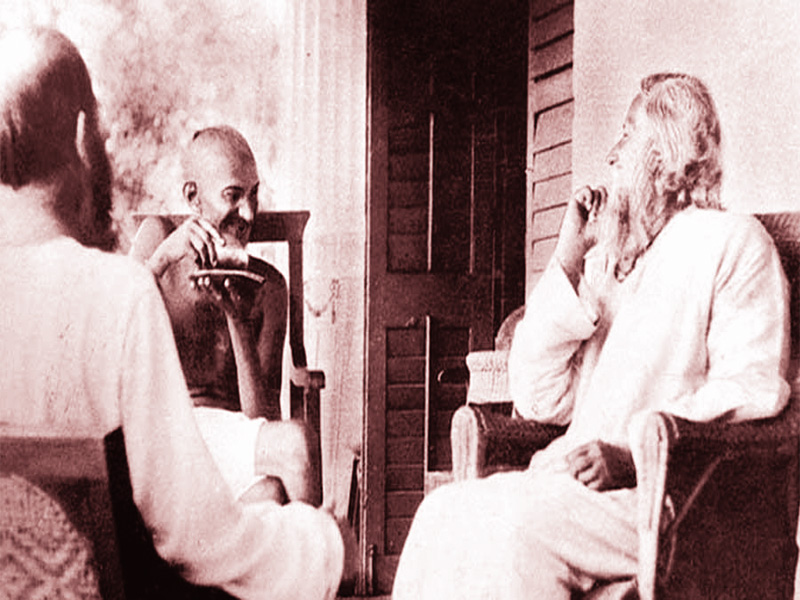Despite their differences on many issues, both recognised that preserving different cultures, traditions and beliefs were crucial for a vibrant society
Hail the new,
Let the sacred hour of birth approaches once more
May you appear in glory, unveiled from the mist
as does the sun.
…From this twenty-fifth day of Boishakh
For the last 161 years now, Tagore lovers all over the world have been invoking every ‘Pochishe Boishakh (25th day of the month of Baisakh)’, his birthday, with “He Nutan, Dekha Dik Arbar…”. The song, specially created for the occasion, was written and composed by Gurudev Rabindranath Tagore himself. While May 7 is Tagore’s official birth date, May 9, 2023, will be celebrated as the 162nd birthday of Gurudev Tagore as it is the 25th day of the month of Baisakh.
Welcoming the new dawn, the song, set in the morning raga Bhairavi, prays for the auspicious moment of birth to return, like the sun rises every day displacing all morning haze and mist. He Nutan… celebrates Gurudev’s love for life. Written at a time during World War II, when the world was witnessing a dance of death, the song gives the message of a strong hope that human life won’t wither away. The date when he wrote the song was May 6, 1941. Two days later, his birthday was celebrated with much fanfare. Exactly three months later on August 7, 1941, the Bard of Bengal breathed his last.
The poem presents the universal values that encompass Tagore’s persona which is reflected in his poems, essays, stories, letters and lectures. For Tagore, “Universalism” was not merely an abstract idea, but a practical approach to social, cultural, and political issues. Tagore was a poet, writer, and philosopher, whose work emphasized the importance of cultural exchange and dialogue in building a more inclusive and equitable world. His advocacy for universalism was deeply rooted in his vision of a free and democratic India.
This was perhaps one of the many reasons that brought Rabindranath Tagore and Mahatma Gandhi close to one another, despite their differences of opinion. Like Gurudev, a title bestowed by Gandhiji to Tagore, Mahatma Gandhi, (Tagore had called Gandhi Mahatma for the first time in April 1919) was deeply committed to the principles of ‘universalism’, which Gandhi saw as a means of promoting social justice and equality. For him, “Universalism” meant recognizing the dignity and worth of every human being, and working to create a society that was inclusive, compassionate, and respectful of diversity.
Moreover, both recognized that different cultures, traditions, and beliefs were an essential part of human experience and that preserving these differences was crucial for maintaining a healthy and vibrant society, which could find common ground to build bridges between different communities.
The relevance of Gandhi and Tagore's philosophy of ‘universalism’ is evident in today's world, where divisions and conflicts are all too common. The principles of respect, tolerance, compassion and empathy that underpin universalism can help to build bridges between different communities, promoting understanding and cooperation. American philosopher Martha Nussbaum has argued that “Universalism is an antidote to the politics of fear and exclusion that are so prevalent today.” In her book "The Cosmopolitanism Reader," she points out that "The global interdependence of our world makes it increasingly necessary for us to recognize the importance of our shared humanity and to build institutions and practices that reflect that recognition." Nobel Laureate Amartya Sen also points out that “The world is much more connected now than ever before, and the only way forward is to understand and respect each other's cultures and traditions.”
The principles of ‘universalism’ can also be seen in the growing importance of global issues such as climate change, poverty, and inequality, which have an effect on people, regardless of their nationality, race, or religion, and require collective action and cooperation to address this effectively, further emphasizing, the shared responsibility that all individuals have to bear for the health and well-being of the planet.
Tagore and Gandhi’s philosophy of “universalism’ has influenced leaders around the world. Nelson Mandela, for example, was inspired by Gandhi's ideas of nonviolent resistance, which he applied in his own struggle against apartheid in South Africa. Similarly, the Dalai Lama has spoken about the importance of Tagore's philosophy of universalism, emphasizing the need for a compassionate and inclusive approach to global issues. Similarly, the Jewish philosopher Martin Buber saw Tagore's ideas as a way to bridge the divide between East and West and to create a more inclusive and interconnected world. International organizations such as the United Nations, which is based on the principles of respect for human rights, equality, and social justice have upheld this principle of ‘universalism’ and even through the UN's Sustainable Development Goals (SDGs) that provide a blueprint for building a more equitable and sustainable world.
In a world that is increasingly interconnected and facing global challenges, the principles of ‘universalism’ can provide a basis for building a more inclusive, equitable, and sustainable future for all which can be found in the vision of Gurudev Tagore and Mahatma Gandhi, where focus on respect, empathy, and compassion, rejecting violence and intolerance has been given prime importance. It is time we add it to our DNA.
(The writer is a programme executive, Gandhi Smriti and Darshan Samiti)


























